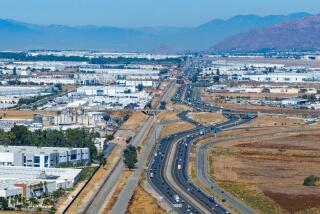We need this NFL stadium
Sometime in the next week or so, the California Senate will decide whether to grant a one-time exemption from provisions of the California Environmental Quality Act to billionaire developer Ed Roski Jr. so that he can proceed with plans to build a new professional football stadium in the City of Industry. Although such a grant would be unprecedented -- and not entirely without risk -- it’s something the Senate needs to do.
Industry, which has slightly more than 80 voters, was incorporated years ago out of what was then farmland as a place where manufacturing and other bothersome commercial activities could proceed around the clock without the regulations or business taxes most cities impose. Located in the southeast San Gabriel Valley near the intersection of the 60 and 57 freeways, it would seem to be an ideal site for a stadium and the adjoining 2.6 million feet of office, medical and other commercial space Roski proposes to build. The developer, who put up Staples Center and L.A. Live south of downtown along with Denver-based billionaire Phil Anschutz, has long maintained the headquarters of his Majestic Realty Co. in Industry, which is one of the reasons he obtained rights to the 600-acre site.
It’s a project whose environmental implications already have been thoroughly studied. Industry required Majestic to do a full environmental report and then a supplemental study to make sure the project complies with the Environmental Quality Act. However, the adjoining city of Walnut and homeowners groups there demanded an additional environmental review and, when Majestic resisted going through the exercise yet again, sued.
Roski, who comes from the when-I’m-pushed-I-shove-back school of local politics, took his case to the Legislature. The Assembly passed a bill granting the exemption, but when the measure moved to the Senate, President Pro Tem Darrell Steinberg put the vote on hold and asked former state Atty. Gen. John Van de Kamp to mediate the dispute. It turned out to be a Solomonic step; at Van de Kamp’s urging, Walnut dropped its suit in return for $15 million in additional mitigation on Majestic’s part.
One homeowners group with just eight members still is holding out.
In the meantime, a number of leading environmental groups have opposed the exemption, arguing that it will constitute a precedent encouraging every other well-heeled, politically savvy developer to seek a similar pass from state environmental laws.
Those are serious reservations, but they ought not to be decisive in this instance. Here’s why:
First, the homeowners’ suit is so frivolous that it comes close to being extortionate. The proposed 75,000-seat stadium not only has been studied up, down and sideways, but it’s far more environmentally friendly than the warehouse complex that was previously slated for the site. If that project had gone forward, there would have been diesel trucks rolling into the facility 24 hours a day, 365 days a year. Moreover, if Roski complied with the homeowners’ major demand that the stadium be domed, the necessity for lights and air conditioning would increase its carbon footprint exponentially. Trucking in the additional steel would dramatically enhance the particulate pollution during construction.
More important, Los Angeles is in the grip of an unemployment crisis, and independent estimates say the stadium project will create 12,000 construction jobs and 6,732 permanent positions in the adjacent facilities -- 100% of them unionized, paying good wages with real benefits.
Former Labor Secretary Robert Reich pointed out this week that the national jobs picture is the worst in seven decades. In Los Angeles, it’s the darkest since the Depression. “The economy may be in a technical recovery, but this is not a real recovery and the ‘green shoots’ or ‘positive signs’ that Wall Street cheerleaders love to shout about are phantoms of their ever-optimistic imaginations,” Reich said in a essay on the Huffington Post. “Before the stimulus, we were losing more than 500,000 jobs a month. Now that 40% of the stimulus has been spent, we are losing more than 250,000 jobs a month.”
If you’re employed, those figures are a problem; if you’re underemployed, they’re a crisis; if you’re jobless, they’re a tragedy.
Walnut, a relatively affluent and leafy community, has a population of just over 30,000 and, according to the most recent figures, a median family income of $105,387. In many of its blue-collar neighbors -- such as La Puente and El Monte -- unemployment is fast approaching 20%.
For these reasons, Steinberg, who has bent over backward to do the right thing by everyone involved, should press for early approval of the exemption. Just as we’ve long recognized that the Constitution is not a suicide pact, we can’t let our environmental laws become a straitjacket.
--
More to Read
Get the L.A. Times Politics newsletter
Deeply reported insights into legislation, politics and policy from Sacramento, Washington and beyond. In your inbox three times per week.
You may occasionally receive promotional content from the Los Angeles Times.










